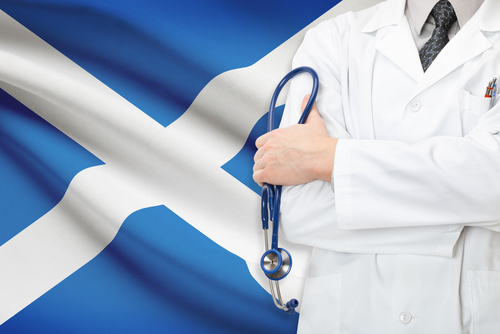Ocrevus Now Available Through NHS Scotland to Treat RRMS

Ocrevus (ocrelizumab, by Genentech) is now available through the National Health System (NHS) of Scotland to treat patients with relapsing-remitting multiple sclerosis (RRMS).
The decision by the Scottish Medicines Consortium (SMC) to approve Ocrevus’ inclusion for this patient group follows the recommendation made earlier by the U.K.’s National Institute for Health and Care Excellence (NICE).
“This is really welcome news for people with relapsing MS in Scotland, as it gives them access to a proven treatment alongside people in the rest of the U.K.,” Linden Muirhead, director of information and engagement at MS Trust, said in a news release.
According to SMC recommendations, Ocrevus can be prescribed to RRMS patients who are experiencing relapses or have brain imaging evidence through MRI (magnetic resonance imaging) of new areas of disease activity. Patients unable or unwilling to be treated with Lemtrada (alemtuzumab, by Sanofi Genzyme) are also eligible to use Ocrevus.
Data presented at a scientific conference this year showed that long-term treatment with Ocrevus — as well as switching from Rebif (interferon beta-1a, EMD Serono) to Ocrevus — can lead to a significant and durable reduction in disease activity. The study from which the presentation was drawn had been sponsored by Hoffmann-La Roche, the global pharmaceutical company to which Genentech belongs.
A decision regarding the treatment’s use by primary progressive MS (PPMS) patients through the NHS is still awaited. A positive NICE opinion obligates the NHS to offer the therapy to eligible patients at no or low cost.
“We are also hopeful that ocrelizumab will be made available for those with early primary progressive MS across the U.K. in the near future. There are currently no treatments that can slow the progression of this form of the disease, in which disability accumulates significantly faster than for those with the relapsing form,” Muirhead said.
NICE was seen to favor rejecting Ocrevus’ inclusion in the NHS as a treatment for PPMS in England and Wales in September, based on its evaluations of the treatment’s cost-effectiveness. However, the agency announced it had postponed issuing a “final guidance” in late October, giving no date for when such a decision might be made.
The additional time allows for new discussions between Genentech and NHS England regarding pricing.
To date, SMC has not scheduled a review of Ocrevus as an NHS treatment for PPMS in Scotland.
The U.S. Food and Drug Administration (FDA) approved Ocrevus to treat both relapsing forms of MS and PPMS in March 2017. The E.U., Canada, Australia, Switzerland, and countries in the Middle East and South America followed.
Recent studies have shown that Ocrevus can slow disability worsening in PPMS patients, including the possibility of delaying the need for a wheelchair by up to seven years.






